A Grave for Two Read online
Page 2
Exactly like Jan Morell. If he wasn’t especially grateful these days, he was at least decidedly former.
No one opened up.
Jan Morell thought he heard a cat meow. He hammered loudly on the filthy door and rang the doorbell again. Now he heard footsteps.
Someone inside touched the door handle. The security chain rattled. In a slender gap between the door and the frame, Selma’s right eye and the corner of her mouth came into view.
She said nothing. Just stood there, as if she needed time to comprehend that he had found her. He glanced down. A cat’s face, he concluded. The animal looked as if it had been involved in a head-on collision: its nose was like a flat button just below its ice-blue, over-large and fairly prominent eyes.
‘Open up,’ he said brusquely, nudging the door with his elbow. ‘I have an offer you can’t refuse. One last, substantial wager.’
Resolutely, he shoved open the door and strode inside.
THE TUBE
Hege was at home alone. In the small cul-de-sac outside the house in Vettakollen, behind a tall hedge of Serbian spruce, a pack of journalists and photographers had set up camp. Earlier that evening she had heard them and their vehicles, left with the engines running. The police came. Called by the neighbours, she assumed. The photographers, who had squeezed through the hedge and come terrifyingly close, were shown off the premises by four uniformed men with barking dogs.
It would soon be ten p.m.
Her father had driven her home after the press conference. Neither of them had spoken a word. They had parked at their neighbour’s house further away and walked along an icy footpath to their own back garden before entering through the patio doors. Once inside, her father had remained tight-lipped. He checked all the entrances twice over before he stopped, took her hands in his and said: ‘I’ll put everything right.’
With emphasis, as if there were a full stop after each and every word. Then he dashed off out again the same way they had come.
This was what he was like. He was someone who put things right. He wished more than anything else in the whole world that someone would put things right. Clear up a horrendous misunderstanding. Find the mistake. Find five mistakes or ten or however many there were that had convinced Anti-Doping Norway that she was a drugs cheat. That she had used an anabolic steroid that right now she couldn’t even remember the name of, even though she had read their letter over and over again for three days in a row and anyway, knew of it from before.
Hege wanted someone to put things right, but on this particular evening she wished her father hadn’t left. That someone had been there with her. Someone other than Maggi, who presumably sat in her apartment in the basement watching Polish TV.
She walked through the almost pitch dark rooms. Her father had drawn all the curtains, thoroughly and systematically, before he left. Switched on the odd lamp that he had flicked off again on his second round. Hege stopped in front of the fridge. Opened it. She hadn’t eaten since breakfast, but didn’t want anything. Nothing except for her father to come home.
And that her mother would rise from the dead.
And that someone from Anti-Doping Norway would ring the doorbell with a broad smile and apologize for the dreadful misunderstanding. She certainly had not given a positive drugs test and would have to forget the terrible scene in front of the press corps when she managed to hold back the tears until her father had led her through a maze of corridors down to the basement car park. Someone else had driven out in her father’s Mercedes with the smoked glass windows to fool the journalists for long enough to enable the two of them to follow unnoticed in a borrowed Honda.
She quickly slammed the fridge door shut again.
It was four days since the World Cup race in Lillehammer. She had been knocked out in the semi-final of the classic sprint, but won the skiathlon the next day. Usually she got a lift with someone for races in Norway and Sweden. Teammates or coaches. Physiotherapists or even the national team doctor. This weekend, however, she had driven herself. On her own, in order to listen to an audiobook.
She had almost finished Elena Ferrante’s fourth novel.
It was always Maggi who packed for her. Packed and unpacked her travel bag. Maggi washed the clothes as well. The home help had been with them since Hege’s mother had died, and on the whole attended to most of the chores she and her father found tedious. Changing the bedclothes. Cleaning. Tidying. Preparing food. Following strict instructions, certainly; a dietician, commissioned by her father, had put together an all-year diet Hege stuck to as if her life depended on it.
And it did, of course, in a sense.
It was a matter of optimizing the possibility of winning, as her father said.
Since Hege had collapsed into bed when she came home on Sunday evening, and then woke to the news that she had failed a drugs test, she had not noticed that her bag had been emptied, the contents washed and everything put back in place. In the following days, Maggi had sneaked around like a kind, but deferential and almost invisible, ghost.
Hege ran down the stairs, taking three steps at a time. She dashed into her own room and flung open the double doors of her wardrobe. The light came on automatically. On one side of the seven square metres of storage hung her training gear. It was impossible to say if anything was missing, but the bag was empty and in the right place on the floor beside the bathroom door. She let her fingers slide across the row of hanging clothes. Stopped and tugged at a sleeve. She had worn that jacket on Sunday.
For a moment she stood deep in thought.
There were the pull-on trousers she had packed at the bottom of the bag; the zip was faulty and needed to be fixed.
Everything was here. Maggi had done her job, as Maggi always did whatever she had to. The big toiletry bag, with extra room for her carefully measured asthma medications, should be placed in the top drawer under the bathroom basin. She only used it when travelling. It contained everything she needed, and lest she forget anything on a trip, she had a double set of everything. Hege opened the door into her own bathroom and pulled out the drawer. The toiletry bag was where it should be. She picked it up, placed it on the counter beside the basin and opened it.
Deodorant. Approved by the national team’s doctor. Make-up. Approved by the national team’s doctor. Toothpaste, hairbrush in a plastic bag, mint dental floss. The perfume her father had given her at Christmas, examined and approved by all the expertise with which her father always surrounded himself. Three inhalers. A packet of Paracet, unopened.
She stacked the items one on top of the other in the wash-hand basin. The toiletry bag was soon empty.
The unfamiliar tube lay at the very bottom. In a rectangular white box with green and black writing. Together with some sort of ‘no admittance’ mark in red, fairly large, stamped above the words ‘BANNED SUBSTANCE’ in black.
TROFODERMIN was the name of the medication.
Hege dropped the box on the floor.
Her ears were ringing. She tried to blink away the black dots dancing in front of her eyes. She grabbed her inhaler, applied it to her mouth, pressed and took a deep breath.
Open-mouthed, she continued gasping for breath.
She was well aware what Trofodermin was.
On the other hand, she had no idea how the package had ended up in her toiletry bag, in her luggage, after a successful World Cup weekend in Lillehammer.
Absolutely not the foggiest, and the world had stopped spinning.
THE GLASS PALACE
He was freezing.
Arnulf Selhus knew it wasn’t cold in the large room. The temperature and air quality were controlled by an installation so modern that only two years ago, when the king had formally opened the building, it was the only one of its kind in the world. All the public rooms were set at 20.00 degrees Celsius, right down to the decimal point. Nevertheless his teeth were nearly chattering.
Sølve Bang apparently noticed nothing.
‘This is a scandal,’ he shout
ed. ‘A scandal we simply can’t afford, Arnulf. Taking drugs is completely unacceptable!’
The platitudes sent a shower of fine spittle across the oak table.
‘Of course,’ Arnulf Selhus said apathetically, covering his face with his hands. ‘You’ve said that several times now. But what the hell can we do, eh? Kill the young girl?’
‘That might be an idea,’ was the quick riposte.
Sølve Bang stood up just as abruptly as he had dropped into the pale-blue designer chair only two minutes earlier.
‘She’s never been really popular. That goes without saying. She’s far too …’
‘Give over. Cut it out.’
‘Well, she’s certainly created a catastrophe now. She’s responsible. Someone is responsible. Nothing here in this world happens without someone being responsible, Arnulf. It’s a betrayal. A dreadful betrayal of us all. Of the Federation, of the other team members, of …’
‘Of you,’ Arnulf mumbled into his own hands, so softly that he hardly heard it himself.
‘What did you say?’
‘Nothing. But now you should really calm down. Strictly speaking, this doesn’t have anything to do with you, Sølve. We have procedures for this. Protocols. Rules.’
‘Rules? Protocols?’
The small, corpulent man’s voice rose to a falsetto. He began to trot back and forth across the floor, parallel to the glass wall that on some days let the whole of the Oslo Fjord reveal itself out there. Now, as usual for the time of year, a peasouper of a fog weighed down on its huge, cold expanse.
Arnulf Selhus raised his eyes again. Sølve Bang walked with short steps, had a pendulous paunch and a nose so long that it almost touched his upper lip. His eyes, normally slightly protruding, had begun to look cross-eyed in his agitation.
He didn’t look much like a former skier.
Maybe not much like a writer, either, Arnulf thought, although admittedly writers came in all shapes and sizes.
The yellow memory stick hanging round his neck, on a narrow chain of the same material, bounced up and down on his tie as he trotted around. He continually touched it with his fingers, on hands that could have belonged to a girl. Arnulf Selhus had known this man since 1982 and had never particularly liked him. But right here and now he felt an unfamiliar, new sense of loathing.
Or fear, it suddenly struck him.
The room was filled with dread. It lurked in the corners. It hid behind the straight, pale curtains he felt an almost irresistible urge to close. Even outside the ridiculously large windows, between the dark spruce trees that flanked the car park, it looked as if an indefinable, dark-grey presence threatened to force its way in through the glass and seize him.
Arnulf Selhus had difficulty breathing deeply enough.
Sølve had enough on his plate and still noticed nothing.
That a man who had won one measly World Cup race thirty-five years ago was permitted to behave as if he owned Norwegian cross-country skiing was beyond Arnulf’s comprehension.
Sølve Bang had even managed to steamroll through this damned building, this glass monument on the slopes of Holmenkollåsen. With himself as head of the jury when the architecture competition was advertised, and later in charge of the building committee.
Many people thought when cross-country skiing had broken free from the Norwegian Ski Federation in 2008 it had been an example of sheer hubris. Arnulf Selhus among them. Classic short-sightedness as he had both thought and said at the time. The administration of cross-country skiing in the Norwegian Ski Federation had landed an exceptional sponsorship contract with Statoil, adding petrol to the flames for those who regarded cross-country skiing as the very jewel in the ice crown of winter sports. Remarkably enough, the agreement was entered into for a period of twenty years, an eternity in sponsorship terms. Alpine skiing could go its own way, was a comment muttered ever more loudly in the corridors after the deal had been struck. In truth, it was only a tiny group of adherents that bothered about Telemark skiing. Similarly with the loopy snowboard fraternity – anyway, it was populated by individuals who had never really understood the meaning of organization. Freestyle skiing was for teenagers and had barely contributed one iota since Kari Traas’s time.
Norway was cross-country skiing, and Norwegian cross-country skiing could stand on its own two agile feet.
The Cross-Country Skiing Federation was now only nine years old, and its independent status had failed to be the picnic that Sølve Bang and his many followers had anticipated.
Neither had they anticipated a top athlete being caught up in a drugs scandal.
Clapping his hands to his face, Arnulf groaned.
‘We have to talk to the sponsors,’ he said. ‘They can’t just …’
‘That’s exactly what they can do,’ Sølve snarled, taking hold of his memory stick as he approached his companion. ‘All sponsors have a drugs clause. Statoil’s is unconditional and strict. They have every right to pull the plug on us, Arnulf!’
‘We still have the state sponsorship. Lottery funds. Volunteerism. The smaller sponsors, such as MCV. We can still …’
‘Volunteerism? Do you think this … this …’
He let go of the memory stick and spread his arms.
‘Do you think the Crystal Palace was built from money raised by selling waffles? Do you think it’s the old biddies shuffling around out there …’
His slender right hand waved uncertainly in the direction of the grey windows.
‘… holding jumble sales and making hot dogs and whatever else they … Do you think it’s volunteerism that has made it possible for the NCCSF to grow to such heights? What? Do you think …’
All of a sudden he subsided on to a chair, clutching his forehead and blowing slowly out through his nose.
‘And with that unstable, incompetent cow in the Ministry of Culture the prospects for lottery funding don’t look too good either,’ he added bitterly. ‘That’s how it goes when people in here have eaten and drunk their fill and travelled business class and then …’
‘Those accounts have been buried,’ Arnulf Selhus broke in sharply. ‘Everything before 2015 has been settled by Parliament. That’s for definite. After Sochi, things don’t look so bad, and those are the accounts the world will respond to. Only those.’
Silence ensued. The fog outside grew even thicker, if that were possible. When he abruptly rose to his feet and stood facing the window, the lights down in the car park were reduced to vague cotton wool dots of lighter grey against all the darkness.
‘But let’s take one thing at a time,’ he concluded, tugging at his tie. ‘We have enough on our plate with Hege right now. And anyway, neither you nor I will be the ones to deal with this situation. I’m going home.’
He turned around again.
Sølve Bang seemed deaf to the world. He sat lost in thought, with eyes unfocused. One hand was holding the memory stick, which he clicked in and out of its cover in a nerve-wracking rhythm.
‘I’m going,’ Arnulf Selhus repeated as he headed for the door.
The other man still gave no answer. He clicked and clicked, and as Arnulf Selhus put his hand on the door handle, it dawned on him that neither of them had given a thought to how Hege Chin Morell must be feeling after the revelation.
‘Well, not as fucking awful as me, anyway,’ he muttered inaudibly as he closed the door behind him and left Sølve Bang to sit alone in the spacious conference room which King Harald – in person – had honoured with the name ‘Golden Girls’.
THE BET
‘It’s not connected,’ Selma said, pointing at the black TV screen. ‘I haven’t seen the news for ages.’
‘Well, you have a mobile.’
As Jan Morell scanned around, his expression looked as if he was standing in the midst of a landfill site. His previously narrow nose turned into a straight line.
Selma sat down on the cheese puff settee and made a gesture of invitation to indicate he should do likewise. He remaine
d standing.
‘It’s about Hege,’ he said without making any comment on the apartment apart from a look that continued to scour the room. ‘She’s failed a drugs test.’
‘What?’
‘Anti-Doping Norway claims she’s somehow taken Clostebol. Of course, she hasn’t.’
‘Clostebol?’ Selma repeated. ‘That’s an anabolic steroid, as far as I recall?’
‘Yes, one I knew nothing about. Until three days ago. It’s obviously a misunderstanding. A mistake. Sabotage, at worst. That’s what I want you to find out.’
‘Me?’
She picked up a yellow cushion and put it behind her back before continuing.
‘You’ve given me a deadline of Monday, Jan. This Monday! I was at the bank this afternoon, so that’s already taken care of. Thirteen million kroner have been returned to your account. You’ll just have to wait for the last three. I quite simply can’t cough up any more. Give me two years for that part. I’ll also hand in my licence to practise law, as you’ve demanded. On Monday. If you think I can get to the bottom of something as complicated and serious as a drugs charge by that time, then you overestimate me.’
‘You can work without a licence.’
‘As a lawyer?’
Selma smiled joylessly, pulled out the cushion from behind her back and punched it lightly before clutching it to her chest. It had grown noticeably colder in the last hour.
‘No,’ Jan Morell said tersely, now at least turning to face her.
Until now he had been speaking into thin air. Now he sought eye contact.
‘You can never have access to other people’s money, Selma. We’ve discussed that. You can’t have a licence to practise law with your … predilection. The matter is over and done with.’
‘Then I can’t help you.’
‘Not me. You can help Hege. And you’ll do it as a consultant. Working for me.’

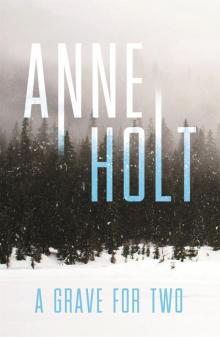 A Grave for Two
A Grave for Two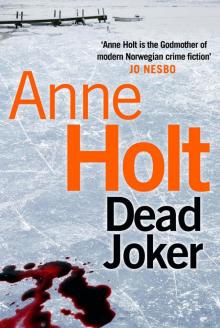 Dead Joker
Dead Joker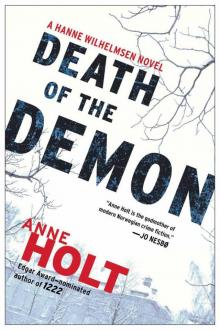 Death of the Demon: A Hanne Wilhelmsen Novel
Death of the Demon: A Hanne Wilhelmsen Novel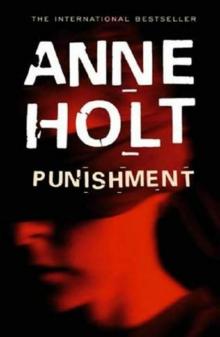 Punishment aka What Is Mine
Punishment aka What Is Mine Beyond the Truth
Beyond the Truth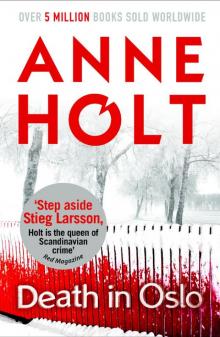 Death in Oslo
Death in Oslo The Blind Goddess
The Blind Goddess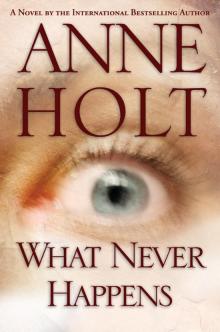 What Never Happens
What Never Happens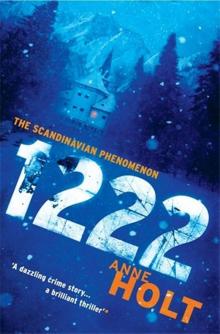 1222
1222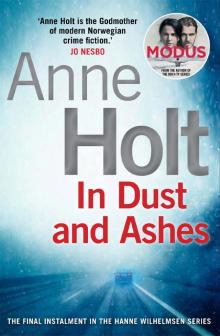 In Dust and Ashes
In Dust and Ashes Odd Numbers
Odd Numbers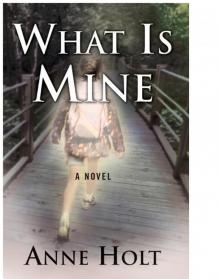 What is Mine
What is Mine What Dark Clouds Hide
What Dark Clouds Hide Blessed Are Those Who Thirst
Blessed Are Those Who Thirst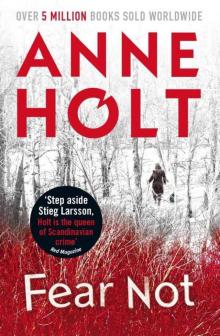 Fear Not
Fear Not No Echo
No Echo Hanne Wilhelmsen - 01 - The Blind Goddess
Hanne Wilhelmsen - 01 - The Blind Goddess